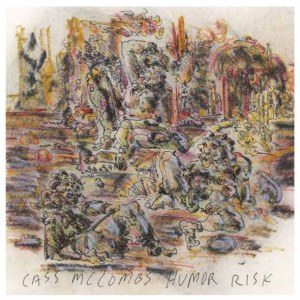St Vincent - Leeds

On more than one occasion this evening, Annie Clark (St. Vincent) manifests on stage as a bona fide Rock God. During countless almighty guitar solos that combine with the Brudenell’s apocalyptic stage lighting and dry ice, she evokes a time when all guitarists of her ilk had mullets and wore spandex. Famously, they would use their guitars as extensions of their penis. Here and now, however, Clark’s guitar merely serves as an extension of her brilliance.
The wide-eyed, Texan multi-instrumentalist single handedly blows to pieces all the pomp, cliché and chauvinism that have justifiably given that kind of posturing a bad name. What’s left is a performance as sincerely affecting as it is entertaining; songs with an intense emotional core that sound as satisfying sonically as the most OTT rock.
Set opener ‘Surgeon’ grows, with lyrics that recall bedbound recovery from panic attacks, to a climactic nervous breakdown of cataclysmic, fuzzy synths, scrambled guitar notes and pounding drums - typical of Clark’s ability to combine sensitivity with bombast.
Clark’s innovative guitar skills alone are worth the ticket. Hers is a unique style made possible by an ability to arch her fingers into spiders’ legs, which delicately crawl up and down the fret board to produce eccentric and singular riffs. It’s abrasive, but thrillingly so, as anyone who’s heard Strange Mercy, the band’s third and best album, would testify. Cuts from the incredible album form the bulk of the set, with every song but ‘Hysterical Strength’ getting an airing.
The awesome thump of ‘Cheerleader’, fleshed out by sample pads, and heightened drama of ‘Strange Mercy’, which uses Clark’s virtuous vocals as its axis, are the pinnacles of a set that will go down as one of the best the Brudenell has ever seen. The other members of the band deserve special praise too, as it’s their proficiency that ensures that the crystalline production of Strange Mercy is preserved in a live setting.
In terms of older songs, ‘Save Me From What I Want’, ‘Actor Out Of Work’ and ‘Marrow’ - all highlights from 2009’s Actor - benefit from the muscular songwriting prowess perfected on the band’s latest record. Old set against new, it’s clear that the band were merely warming up before the triumph that is Strange Mercy.
Later on, a rampant cover of The Pop Group’s ‘She Is Beyond Good And Evil’ gives a good indication of where the inspiration for Clarke’s convoluted pop songs comes from. This is mirrored in the demented aggression of ‘Northern Lights’, which also benefits from the expert use of a theremin as drinks table and high-pitched squeal machine. ‘Year Of The Tiger’ may have other, less obscure influences, but is just as idiosyncratic- if only for its repeated refrain of “Oh America, can I owe you one?” and its irresistible prog-rock grandeur.
‘Your Lips Are Red’ brings the night to a dramatic finish as Clark, intermittingly basking in bright neon light and pulling off another thorny solo, balances on the edge of the stage before wading straight into the middle of the audience for the song’s frantic conclusion. Clark may be a Saint in name, but in spirit she’s much, much more.
The wide-eyed, Texan multi-instrumentalist single handedly blows to pieces all the pomp, cliché and chauvinism that have justifiably given that kind of posturing a bad name. What’s left is a performance as sincerely affecting as it is entertaining; songs with an intense emotional core that sound as satisfying sonically as the most OTT rock.
Set opener ‘Surgeon’ grows, with lyrics that recall bedbound recovery from panic attacks, to a climactic nervous breakdown of cataclysmic, fuzzy synths, scrambled guitar notes and pounding drums - typical of Clark’s ability to combine sensitivity with bombast.
Clark’s innovative guitar skills alone are worth the ticket. Hers is a unique style made possible by an ability to arch her fingers into spiders’ legs, which delicately crawl up and down the fret board to produce eccentric and singular riffs. It’s abrasive, but thrillingly so, as anyone who’s heard Strange Mercy, the band’s third and best album, would testify. Cuts from the incredible album form the bulk of the set, with every song but ‘Hysterical Strength’ getting an airing.
The awesome thump of ‘Cheerleader’, fleshed out by sample pads, and heightened drama of ‘Strange Mercy’, which uses Clark’s virtuous vocals as its axis, are the pinnacles of a set that will go down as one of the best the Brudenell has ever seen. The other members of the band deserve special praise too, as it’s their proficiency that ensures that the crystalline production of Strange Mercy is preserved in a live setting.
In terms of older songs, ‘Save Me From What I Want’, ‘Actor Out Of Work’ and ‘Marrow’ - all highlights from 2009’s Actor - benefit from the muscular songwriting prowess perfected on the band’s latest record. Old set against new, it’s clear that the band were merely warming up before the triumph that is Strange Mercy.
Later on, a rampant cover of The Pop Group’s ‘She Is Beyond Good And Evil’ gives a good indication of where the inspiration for Clarke’s convoluted pop songs comes from. This is mirrored in the demented aggression of ‘Northern Lights’, which also benefits from the expert use of a theremin as drinks table and high-pitched squeal machine. ‘Year Of The Tiger’ may have other, less obscure influences, but is just as idiosyncratic- if only for its repeated refrain of “Oh America, can I owe you one?” and its irresistible prog-rock grandeur.
‘Your Lips Are Red’ brings the night to a dramatic finish as Clark, intermittingly basking in bright neon light and pulling off another thorny solo, balances on the edge of the stage before wading straight into the middle of the audience for the song’s frantic conclusion. Clark may be a Saint in name, but in spirit she’s much, much more.



